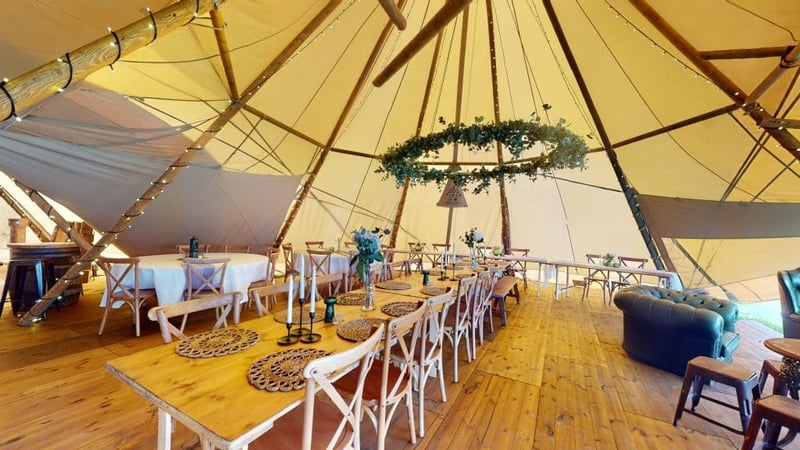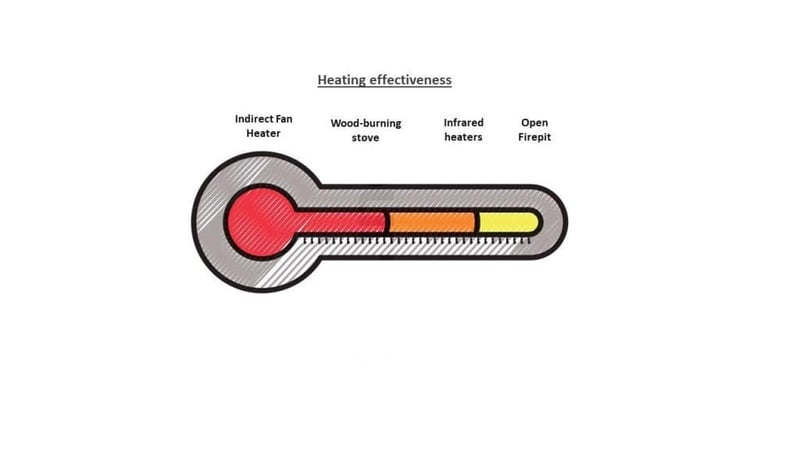Health and Safety Considerations for a Permanent Tipi Wedding Venue
As the demand for unconventional and unique wedding locations rises, more companies are beginning to venture into the world of outdoor event management. It’s incredibly important to prioritise health and safety considerations to ensure a secure and successful experience for all involved.
In this guide, brought to you by The Tipi Company, we’ll explore the key aspects of health and safety that should be on your checklist when establishing a permanent tipi wedding venue in the UK.

Gaining the appropriate licenses
Once you have gained planning permission for an outdoor wedding venue, as a venue operator, it is up to you to ensure that your venue also meets all the required health and safety standards, including fire safety and accessibility. Insurance is another critical aspect; make sure to get the necessary coverage for property, liability, and any specific requirements related to your venue.
Terrain considerations
One of the primary considerations when setting up a tipi wedding venue is the terrain. Choosing a suitable location with a level and well-drained surface is essential for stability and safety.
During a Complimentary Site Visit with one of our Tipi Experts, your land will be measured and advice will be given on what you can do to make your land more suitable should there be any issues identified.
For permanent tipi installations, our Installation Team will, more often than not, build your tipis on top of a raised wooden base that stands up from the ground and ensures a level formation. Should you have an incredibly uneven site, we offer an Elevation Package to account for this.
We have installed tipis on mountainsides, rooftops, lakesides, and much more – so we can pretty much build your tipis anywhere. It will be crucial to alert us to any underground pipes, overhead wires, or any other hazard that might affect the build. National Grid recommended that a gap of at least 6 metres be left between power lines and the tent’s highest point. (https://www.nationalgrid.co.uk/)
Given the UK’s unpredictable weather, your tipi should be robust enough to withstand various conditions. At The Tipi Company, we pride ourselves on manufacturing tipis that have strong tipi wind loadings and offer many types of Anchorage solutions, ensuring a safe and secure environment for guests.
Heating the structure
For outdoor weddings and events, adequate heating is crucial to its success. Even though the British summers can be warm, once the sun sets at around 9/10pm, the space will feel cool quickly. It is at that point that a suitable heating method is used. For autumn and winter events, heating is a must to ensure comfort for all guests.
Four methods of heating outdoor event structures include:
- Indirect fan heater
- Wood-burning stove
- Overhead infrared heaters
- Open firepit
The Tipi Company has a number of partnerships with reliable heating suppliers throughout the UK. Get in touch with our team for more advice.

Lighting considerations
Creating a magical ambience in your tipi wedding venue relies heavily on effective lighting. However, it’s not just about aesthetics; proper illumination is vital for guest safety.
Inside the tipis, the most effective popular option for lighting the space is fairy lights to all main poles.
For outside the formation, we suggest opting for low-voltage, weather-resistant lighting to reduce the risk of accidents. Pathway festoon lights are some of the best lights for tipis, illuminating walkways, entrances, and exit points to guide guests safely during the evening festivities. Be sure to regularly inspect and maintain lighting fixtures to prevent malfunctions and potential hazards.
Weather considerations
One of the challenges associated with outdoor weddings is navigating unpredictable weather. At The Tipi Company, we’ve designed our event tipis with adverse weather conditions in mind, ensuring they are sturdy and can withstand various weather conditions.
The wooden poles we use in the construction of our framework have been sourced from Northern Scandinavia, thus producing the structural integrity our wind loadings depend on. After many tests, we have found that UK-grown wood used in competitor frameworks simply isn’t strong enough. Welsh-grown spruce, or wood from the New Forest hasn’t been grown in cold enough conditions, which makes them quicker to grow. Great if you want a quick turnover of material supply, but not so great if you want to rely on strength in windy conditions. Due to the freezing temperatures our wood grows in, the spruce we use is slow-growing and late-maturing thus making the growth rings incredibly compacted. This is what makes the wood stronger than any UK-grown wood.
That said, we suggest venue owners establish the use of a comprehensive weather contingency plan, which we provide to all of our new clients. Permanent TipiWall sides (that can be zipped up and down depending on the weather), heating solutions for colder months, and securing additional shelter options are effective ways to mitigate the impact of adverse weather conditions. Consider also investing in weather monitoring tools to stay ahead of sudden changes and make informed decisions to ensure everyone’s safety.
Be sure to provide guests with clear guidelines on what to expect in case of adverse weather conditions. Communication with clients is key, giving them the confidence that their special day can proceed seamlessly, come rain or shine. It is important to have a “watertight” contract in place with your clients to cover you in the unlikely case of an event cancellation or mishap. Employing a solicitor to help you draw this up would be advisable, but it’s also worth noting that we include a base template with our New Business Starter Pack to help you on your way.
Hygiene and sanitation procedures
Maintaining high standards of hygiene is not only a matter of comfort but also a critical health consideration. It’s super important to introduce a robust waste management plan, including suitable bathroom facilities and waste disposal systems. Regular cleaning and sanitation procedures should be established to keep communal areas hygienic and safe for guests. It’s also a must that hand washing and hand sanitising stations are available throughout the venue.
Accessibility
Ensuring accessibility for all guests, including those with mobility challenges, is a key health and safety consideration for your permanent tipi wedding venue. We advise that you assess and address accessibility issues, such as providing ramps, clear pathways, and accessible bathroom facilities. Communicate accessibility information clearly to guests in advance and be prepared to offer assistance if needed.
Helping you to launch your permanent tipi wedding venue
If you prioritise safety in your planning and operations, you not only comply with regulations but also build trust with your clients, making your venue a reliable choice for their special day and encouraging recommendations. Here at The Tipi Company, we are here to help you, every step of the way. We build more than tipis, we help build businesses.
For more information on our tipis, the types we have available, and how they can transform your business, get in contact with the team at The Tipi Company.
Topics from this blog: Beyond The Poles
Back
